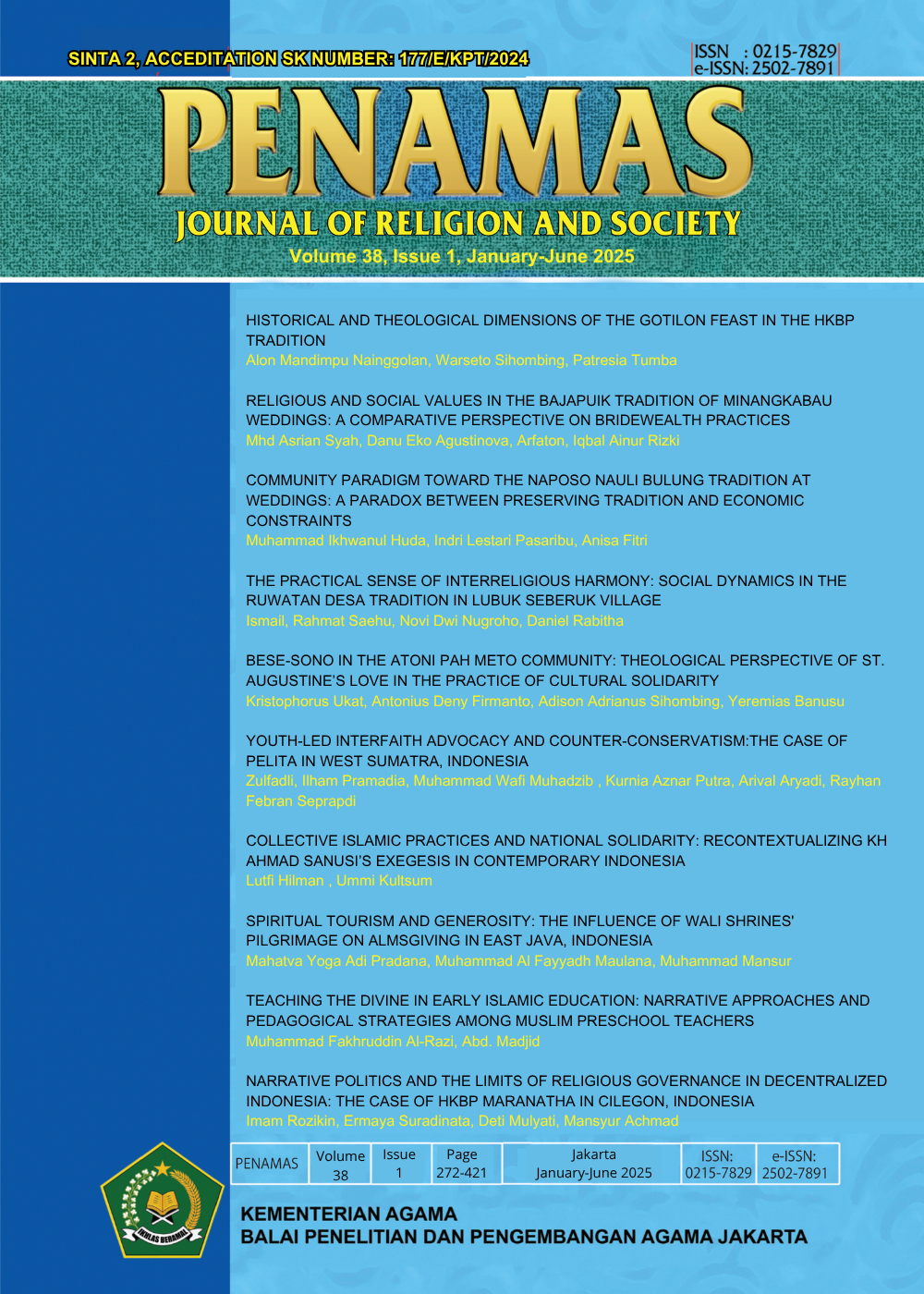COLLECTIVE ISLAMIC PRACTICES AND NATIONAL SOLIDARITY: RECONTEXTUALIZING KH AHMAD SANUSI’S EXEGESIS IN CONTEMPORARY INDONESIA
DOI:
https://doi.org/10.31330/penamas.v38i1.882Keywords:
KH Ahmad Sanusi, collective Islamic practices, social cohesion, national solidarity, Qur’anic exegesisAbstract
This article explores KH Ahmad Sanusi’s Qur’anic exegesis as a foundation for collective Islamic practices that strengthen national solidarity in contemporary Indonesia. Drawing on his interpretations of key verses, the study situates Sanusi’s thought within the historical context of struggles against colonialism and the present challenges of identity politics, digital disinformation, and eroding social trust. Through a qualitative analysis that combines contextual hermeneutics and comparative synthesis, the research demonstrates that Sanusi advocates for unity as an ethical imperative, manifest in shared rituals, communal discipline, and a collective commitment to moral renewal. Unlike state-led moderation that often emphasizes procedural tolerance, his exegesis emphasizes transforming individual dispositions and sustaining solidarity through religious ethics. While this approach provides profound insights into fostering cohesive civic identities, it faces limitations in adapting to pluralistic frameworks and decentralized authority. By integrating classical tafsir with contemporary sociopolitical analysis, this article contributes an interdisciplinary perspective on collective religious practices as a resource for resilient national cohesion.
References
Abduh, M., & Ridha, R. (1947). Tafsir al-Manar. Cairo: Al-Manar.
Al-Ansi, A. M., & Kartono, R. (2023). The role of Islamic organizations 'Muhammadiyah and Nahdlatul Ulama' in forming national politics in Indonesia. Polit Journal Scientific Journal of Politics. https://doi.org/10.33258/polit.v3i2.895
Arifianto, A. R. (2019). What the 2019 election says about Indonesian democracy. Asia Policy, 26, 46–53. https://doi.org/10.1353/asp.2019.0045
Arifianto, A. R. (2021). From ideological to political sectarianism: Nahdlatul Ulama, Muhammadiyah, and the state in Indonesia. Religion, State & Society, 49(2), 126–141. https://doi.org/10.1080/09637494.2021.1902247
Arnez, M. (2010). Empowering women through Islam: Fatayat NU between tradition and change. Journal of Islamic Studies, 21(1), 59–88. https://doi.org/10.1093/jis/etp025
Aspinall, E., & Mietzner, M. (2019). Indonesia’s Democratic Paradox: Competitive Elections Amidst Rising Illiberalism. Bulletin of Indonesian Economic Studies, 55(3), 295–317. https://doi.org/10.1080/00074918.2019.1690412
Azra, A. (2006). Islam in the Indonesian World: An Account of Institutional Formation. Mizan.
Barberá, P. (2020). Social media, echo chambers, and political polarization. In N. Persily & J. A. Tucker (Eds.), Social Media and Democracy (pp. 34–55). Cambridge University Press. https://doi.org/10.1017/9781108890960.004
Creswell, J. W., & Poth, C. N. (2018). Qualitative Inquiry and Research Design: Choosing Among Five Approaches (4th ed.). Thousand Oaks, CA: SAGE.
Denzin, N. K., & Lincoln, Y. S. (2018). The SAGE Handbook of Qualitative Research (5th ed.). Thousand Oaks, CA: SAGE.
Fakultas Ilmu, Sosial dan Ilmu, Politik Uin, & Syarif Hidayatullah. (2013). The ulama in Indonesia: Between religious authority and symbolic power.
Fauzi, N. A. F. (2023). Zulkarnain El Madury and the micro-celebrity ustaz phenomenon. Indonesia and the Malay World, 51(149), 304–329. https://doi.org/10.1080/13639811.2023.2274708
Fealy, G., & Bush, R. (2014). The political decline of traditional ulama in Indonesia: The state, umma and Nahdlatul Ulama. Asian Journal of Social Science, 42(5–6), 536–560. https://doi.org/10.1163/15685314-04205004
Habibisubandi, H. B. (2018). Political polarization based on religious identities: Empirical evidence from the 2017 Jakarta Gubernatorial Election.
Halim, W. (2022). The mass production of religious authority: A study on a Ma‘had Aly program in South Sulawesi, Indonesia. Islamic Studies Review. https://doi.org/10.56529/isr.v1i2.83
Hariyadi, H., Shidiq, A. R., Yusuf, A., & Mahardhika, D. W. (2023). Comparing religious intolerance in Indonesia by affiliation to Muslim organizations. Pacific Affairs. https://doi.org/10.5509/20239615
Hutabarat, F. (2023). Navigating diversity: Exploring religious pluralism and social harmony in Indonesian society. European Journal of Theology and Philosophy. https://doi.org/10.24018/theology.2023.3.6.125
Jati, R. P., & Risdianto, F. (2017). Proceedings International Conference on Indonesian Islam, Education and Science (ICONIS) 2017. Tarbiyah, 1–880. https://doi.org/10.18326/tarbiyah.v0i0.1-880
Jati, W. R. (2022). Polarization of Indonesian society during 2014–2020: Causes and its impacts toward democracy. Jurnal Ilmu Sosial dan Ilmu Politik. https://doi.org/10.22146/jsp.66057
Judijanto, L., Siminto, S., & Rahman, R. (2024). The influence of religious beliefs and religious practices on social cohesion in modern society in Indonesia. The Eastasouth Journal of Social Science and Humanities. https://doi.org/10.58812/esssh.v1i03.276
Karmila, L., Rachmiatie, A., Santana K, S., Fardiah, D., Ahmadi, D., & Muhtadi, A. S. (2024). The role of social media in the political construction of identity: Implications for political dynamics and democracy in Indonesia. Journal of Infrastructure, Policy and Development. https://doi.org/10.24294/jipd9171
Katadata Insight Center. (2022). Survei literasi digital nasional 2022. Jakarta: Katadata. https://katadata.co.id/
Kayane, Y. (2021). Historical formation of Islamist ideology in Indonesia: The role of the Indonesian Islamic Propagation Council (DDII). Critical Asian Studies, 54(1), 47–66. https://doi.org/10.1080/14672715.2021.2008261
Kim, L. (2023). The echo chamber-driven polarization on social media. Journal of Student Research, 12(4). https://doi.org/10.47611/jsr.v12i4.2274
Lutfi, L., & Rashid, T. (2019). Tafsir and social political context in Indonesia: A case study on Ahmad Sanusi’s interpretation as a medium of struggle in colonial era. Jurnal Ushuluddin, 13, 1–8.
Mahadian, A. B., Hashim, R., & Mustafa, H. (2023). Articulating Islamist sectarian group antagonism memes on the Indonesian politics. Jurnal Komunikasi: Malaysian Journal of Communication. https://doi.org/10.17576/jkmjc-2023-3903-07
Matin, U. A. (2009). K.H. Ahmad Sanusi (1888–1950): His religio-intellectual discourse and his work collection. Jurnal Lektur Keagamaan, 7(1), 147–164.
Maulana, A., & Situngkir, H. (2020). Media polarization on Twitter during 2019 Indonesian election. In Proceedings of the International Conference on Complex Networks and Their Applications (pp. 660–670). Springer. https://doi.org/10.1007/978-3-030-65347-7_55
Mawardi, K. (2024). Dynamics of multiculturalism and religious pluralism: Strategies for building social cohesion in Indonesia. Asian Journal of Philosophy and Religion. https://doi.org/10.55927/ajpr.v3i1.10130
Pepinsky, T. B. (2019). Islam and Indonesia's 2019 presidential election. Asia Policy, 26, 54–62. https://doi.org/10.1353/asp.2019.0049
Mietzner, M., & Muhtadi, B. (2020). The myth of pluralism: Nahdlatul Ulama and the politics of religious tolerance in Indonesia. Contemporary Southeast Asia, 42(1), 58–84. https://doi.org/10.1355/cs42-1c
Plikynas, D., Rizgelienė, I., & Korvel, G. (2025). Systematic review of fake news, propaganda, and disinformation: Examining authors, content, and social impact through machine learning. IEEE Access, 13, 17583–17629. https://doi.org/10.1109/ACCESS.2025.3530688
Power, T. P. (2018). Jokowi’s authoritarian turn and Indonesia’s democratic decline. Bulletin of Indonesian Economic Studies, 54(3), 307–338. https://doi.org/10.1080/00074918.2018.1549918
Rahman, F. (1984). Islam and Modernity: Transformation of an Intellectual Tradition. Chicago: University of Chicago Press.
Ray, A., & George, J. (2019). Online disinformation and the psychological bases of prejudice and political conservatism. In Proceedings of the 52nd Hawaii International Conference on System Sciences (pp. 1–11). https://doi.org/10.24251/HICSS.2019.330
Raya, M. K. F. (2024). Digital Islam: New space for authority and religious commodification among Islamic preachers in contemporary Indonesia. Contemporary Islam. https://doi.org/10.1007/s11562-024-00570-z
Rohmana, J. A. (2015). Al-Qur’an wa al-isti’mar: Radd al-shaykh al-hajj Ahmad Sanusi (1888–1950) ‘ala al-isti’mar min khilal tafsir Malja’ al-Talibin. Studia Islamika, 22(2), 297–332. https://doi.org/10.15408/sdi.v22i2.1921
Rubaidi, R., & Setianingsih, D. (2021). Politik identitas Islam Indonesia kontemporer: Radikalisme Islam versus moderatisme Islam dalam politik elektoral Pilpres 2019. Potret Pemikiran, 25(2). https://doi.org/10.30984/pp.v25i2.1593
Ruslan, I., Irham, M. A., & Halim, A. (2023). The 2024 presidential election: Contestation of religious ideology in electoral politics. KnE Social Sciences. https://doi.org/10.18502/kss.v8i16.14056
Saeed, A. (2006). Interpreting the Qur’an: Towards a Contemporary Approach. London: Routledge.
Saiful Mujani Research and Consulting. (2019). Survei nasional: Polarisasi politik pasca pilpres 2019. Jakarta: SMRC. https://smrc.co.id/
Salahudin, S., Nurmandi, A., Jubba, H., Qodir, Z., Jainuri, & Paryanto. (2020). Islamic political polarisation on social media during the 2019 presidential election in Indonesia. Asian Affairs, 51(3), 656–671. https://doi.org/10.1080/03068374.2020.1812929
Salahudin, S., Nurmandi, A., Jubba, H., Qodir, Z., Jainuri, P., & Paryanto, P. (2020). Islamic Political Polarisation on Social Media During the 2019 Presidential Election in Indonesia. Asian Affairs, 51(4), 656-671. https://doi.org/10.1080/03068374.2020.1855642
Saldaña, J. (2016). The Coding Manual for Qualitative Researchers (3rd ed.). London: SAGE.
Sanusi , 1931. Malja’ aṭ-Ṭalibīn fī Tafsīr Kalām Rabb al-‘Ālamīn. jilid 1, Batavia: Maṭba‟ah Ahl as-Sunnah wa al-Jama>‘ah Hārūn bin ‘Alī Ibrāhīm.
Sanusi, Ahmad. 1934. Tafsir Tamsjijjatoel Moeslimien fī Tafsīr Kalām Rab al-‘Ālamīn. Sukabumi: Al-Ittihad.
Sanusi, Ahmad. 1935. Tafsir Tamsjijjatoel Moeslimien fī Tafsīr Kalām Rab al-‘Ālamīn. Sukabumi: Al-Ittihad.
Soderborg, S., & Muhtadi, B. (2021). Resentment and polarization in Indonesia. SSRN Electronic Journal. https://doi.org/10.2139/ssrn.3873291
Syarif, U. A. (2024). The epistemic discourse of religious moderation (Moderasi Beragama) in Indonesia. Digital Press Social Sciences and Humanities. https://doi.org/10.29037/digitalpress.411466
Thoyib, M. E., Degaf, A., Fatah, A. A., & Huda, M. (2024). Religious tolerance among Indonesian Islamic university students: The pesantren connection. Journal of Al-Tamaddun. https://doi.org/10.22452/jat.vol19no2.16
Weiss, M. (2020). Indonesia in 2019. Asian Survey, 60(1), 109–116. https://doi.org/10.1525/as.2020.60.1.109
Winarni, L., Agussalim, D., & Bagir, Z. (2020). Religio-politics of Islamic group in the contestation of 2019 Indonesian presidential election. Politik Indonesia: Indonesian Political Science Review, 5(1), 22–46. https://doi.org/10.15294/ipsr.v5i1.21687
Yasin, Y., & Mantu, R. (2021). Unfulfilled guarantees: Impacts of law and regulations concerning inter-religious relations on religious freedom in Indonesia. Mazahib. https://doi.org/10.21093/mj.v20i1.3113
Yustitia, S., Susilo, M., & Afifi, S. (2019). Opinion polarisation in Indonesia politics. Proceedings of the 1st Asian Conference on Humanities, Industry, and Technology for Society (ACHITS 2019). https://doi.org/10.4108/eai.30-7-2019.2287626
Yusuf, A., Shidiq, A. R., & Hariyadi, H. (2019). On socio-economic predictors of religious intolerance: Evidence from a large-scale longitudinal survey in the largest Muslim democracy. Religions, 11(1), 21. https://doi.org/10.3390/rel11010021
Zaluchu, S. E., Karnadhi, S., Widjaja, F., & Siahaan, H. (2019). Legitimation of religious symbols in politics: Descriptive analysis of the narration of Indonesian election campaign 2019. Proceedings of the International Conference of Democratisation in Southeast Asia (ICDeSA 2019). https://doi.org/10.2991/icdesa-19.2019.13
Downloads
Published
Issue
Section
License
Copyright (c) 2025 Penamas

This work is licensed under a Creative Commons Attribution-NonCommercial-ShareAlike 4.0 International License.









